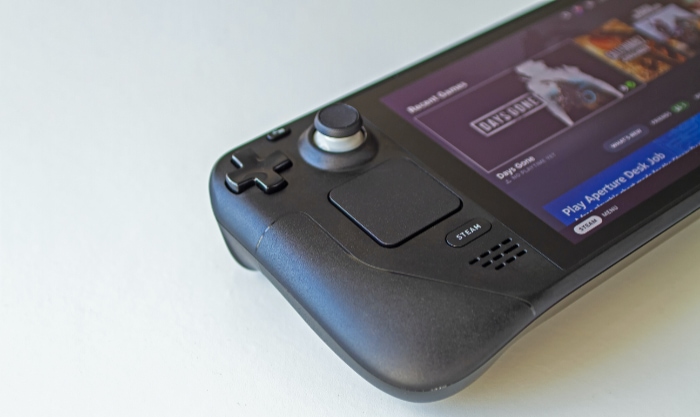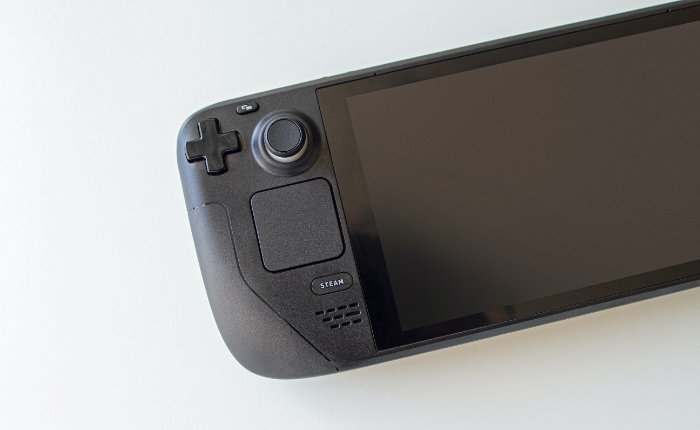Steam Deck vs. Gaming Laptop: A Comprehensive Comparison

In the ever-evolving world of gaming, choosing the right device to fulfill your gaming desires can be a challenging task. The recent introduction of Valve’s Steam Deck, a powerful handheld gaming device, has stirred up the debate between handheld gaming systems and traditional gaming laptops.
This article aims to provide a comprehensive comparison of the Steam Deck and gaming laptops, examining various aspects such as performance, portability, price, game library compatibility, upgradability, and use cases.
By the end of this article, you will gain a deeper understanding of the strengths and weaknesses of each device, enabling you to make an informed decision that best suits your gaming preferences and requirements.
Steam Deck: Overview and Specifications
In this section, we’ll take a closer look at the pros and cons of the Steam Deck, including its unique handheld gaming experience, access to the entire Steam library, and affordable pricing, as well as some potential downsides, such as a smaller screen size and limited hardware upgradability.
Portability and Form Factor
The Steam Deck is a handheld gaming device developed by Valve Corporation, designed to bring the vast library of PC games to the palm of your hand.
With its compact size, measuring 11.7 x 4.6 x 1.9 inches and weighing around 1.47 pounds, the Steam Deck offers a portable gaming experience that can be enjoyed anywhere, anytime. The ergonomic design and button layout make it comfortable to hold and use for extended gaming sessions.
Hardware and Performance
Under the hood, the Steam Deck is powered by a custom AMD APU, which combines a quad-core Zen 2 CPU with RDNA 2 architecture for the GPU. This powerful combination allows the device to run most modern PC games at 720p to 800p resolution, with smooth frame rates.
The Steam Deck is available in three storage configurations: 64GB eMMC, 256GB NVMe SSD, and 512GB NVMe SSD, providing options to cater to different storage needs.
Battery Life
Valve claims that the Steam Deck can deliver between 2 to 8 hours of gameplay on a single charge, depending on the game and settings used. This makes it a reliable companion for gaming on the go, allowing players to enjoy their favorite titles without being tethered to a power outlet.
Pros
We’ll highlight the advantages of each device.
Handheld Gaming Experience
The primary advantage of the Steam Deck is its handheld form factor, allowing gamers to enjoy their favorite PC games in a portable and convenient package.
Whether you’re on a long commute, waiting at the airport, or simply relaxing at home, the Steam Deck is designed to adapt to your gaming needs.
Access to the Entire Steam Library
One of the standout features of the Steam Deck is its seamless integration with the Steam platform, providing users with instant access to their existing Steam library.
This means you can play thousands of games without the need to repurchase them, making the transition to handheld gaming smooth and cost-effective.
Affordable Pricing
The Steam Deck comes in at a relatively affordable price point, with the base model starting at $399. This makes it an attractive option for gamers who want to experience PC gaming without breaking the bank.
Customizability and Mod Support
As a device that runs on a Linux-based operating system, the Steam Deck offers a high degree of customizability and mod support. Gamers can tweak settings, install third-party applications, and even run other game stores, providing a versatile and open platform for gaming enthusiasts.
Cons
We’ll outline some of the potential drawbacks.
Smaller Screen Size
The Steam Deck’s compact form factor means that it has a smaller screen size compared to gaming laptops. With a 7-inch touchscreen display, some players may find it less immersive than playing on a larger screen, especially for games that rely heavily on visuals and detail.
Limited Hardware Upgradability
As a handheld device, the Steam Deck doesn’t offer the same level of hardware upgradability as gaming laptops.
While you can expand storage with a microSD card, upgrading the CPU or GPU is not an option. This may be a concern for gamers who want to keep up with the latest hardware advancements.
Potential Compatibility Issues
While the Steam Deck is designed to support a wide range of PC games, there may still be compatibility issues with certain titles that are not optimized for handheld gaming or require specific peripherals.
Players may need to tweak settings or wait for updates to ensure smooth gameplay on the Steam Deck.
Gaming Laptops: Overview and Specifications

In this section, we’ll explore the advantages and disadvantages of gaming laptops, including their high-performance capabilities, larger displays, and customization options, as well as some potential downsides, such as higher price points, heavier weights, and battery life considerations.
Portability and Form Factor
Gaming laptops strike a balance between portability and performance, making them an ideal choice for gamers who want a powerful machine without being tied to a desk.
While they are generally heavier and bulkier than ultrabooks, gaming laptops come in various sizes and weights, allowing users to choose a device that best fits their needs. Modern gaming laptops often feature slim and sleek designs, making them relatively easy to carry around.
Hardware and Performance
Gaming laptops are equipped with high-performance CPUs and GPUs, enabling them to run demanding games at high resolutions and frame rates.
Many gaming laptops come with NVIDIA GeForce or AMD Radeon graphics cards, providing exceptional gaming performance. Users can also find models with varying amounts of RAM, storage, and display options to cater to different preferences and budgets.
Battery Life
Battery life in gaming laptops varies depending on the hardware and the level of gaming intensity. While some models can last up to 8 hours or more for general use, battery life during intense gaming sessions may be significantly shorter.
It’s worth noting that many gamers tend to keep their gaming laptops plugged in during gaming sessions to ensure maximum performance, which mitigates concerns about battery life.
Pros
We’ll highlight some of the key strengths and benefits of the device.
Higher Performance Capabilities
Gaming laptops offer higher performance capabilities compared to the Steam Deck, allowing users to enjoy demanding games at higher resolutions and settings. This performance advantage makes gaming laptops suitable for hardcore gamers and those who want the best possible gaming experience.
Larger Display
Gaming laptops typically feature larger displays than the Steam Deck, ranging from 13 to 17 inches or more. This larger screen size provides a more immersive gaming experience, especially for visually rich games that benefit from high-resolution displays.
Upgradability and Customization
One of the key advantages of gaming laptops is their upgradability and customization options. Users can often upgrade components such as RAM and storage, allowing them to keep up with the latest hardware advancements and extend the lifespan of their device.
Versatility for Non-Gaming Activities
In addition to gaming, laptops offer versatility for non-gaming activities, such as productivity tasks, video editing, and content consumption. This makes gaming laptops a more practical choice for users who want a single device for both work and play.
Cons
We’ll outline some of the potential drawbacks and limitations.
Higher Price Point
Gaming laptops tend to come with a higher price point compared to the Steam Deck, with prices often starting at $1,000 or more for mid-range models.
While the cost of high-end gaming laptops can vary depending on the specific configuration and model, they generally command a premium due to their advanced hardware and features.
As such, gaming laptops can be a considerable investment for gamers, and it’s essential to research and compare different models to find the best option within your budget.
Heavier and Bulkier
While gaming laptops offer portability, they are generally heavier and bulkier than the Steam Deck or ultrabooks. This can make them less convenient to carry around, especially for users who prioritize mobility and lightweight devices.
Battery Life Considerations
As mentioned earlier, gaming laptops may experience shorter battery life during intense gaming sessions, as the powerful hardware demands more energy.
However, since many gamers tend to keep their laptops plugged in during gaming sessions, this concern is often mitigated. Nonetheless, users who prioritize long-lasting battery life for unplugged gaming should consider this factor when choosing a gaming laptop.
Key Comparison Points

We’ll identify some of the most important factors to consider when deciding between the two devices.
Performance
When comparing the Steam Deck and gaming laptops, performance is a crucial factor to consider. Gaming laptops generally offer higher performance capabilities due to their powerful CPUs and GPUs.
This allows users to run demanding games at higher resolutions and settings. On the other hand, the Steam Deck provides a satisfactory gaming experience for most modern games, but at lower resolutions, primarily due to its compact form factor and focus on handheld gaming.
Portability
Portability is another key aspect when evaluating the Steam Deck and gaming laptops. The Steam Deck excels in this category, offering a compact and lightweight handheld gaming experience.
Gaming laptops, while portable to some extent, are generally bulkier and heavier compared to the Steam Deck or ultrabooks, making them less convenient for on-the-go gaming.
Price
Price is an important consideration for many gamers. The Steam Deck offers a more affordable entry point, with the base model starting at $399. Gaming laptops, however, typically have a higher price point, with mid-range models often starting at $1,000 or more.
Game Library and Compatibility
The Steam Deck provides seamless integration with the Steam platform, allowing users to access their entire Steam library without repurchasing games. Compatibility issues may arise with certain titles, but overall, the Steam Deck offers a vast library of games.
Gaming laptops, on the other hand, can run games from multiple platforms, including Steam, other game stores, and even console emulators, providing a broader range of gaming options.
Upgradability and Customization
Gaming laptops generally offer more upgradability and customization options compared to the Steam Deck. Users can often upgrade components like RAM and storage in gaming laptops, extending their lifespan and keeping up with the latest hardware advancements.
The Steam Deck, however, has limited upgradability options, with the primary option being storage expansion via microSD cards.
Long-Term Investment
When considering the long-term value of both devices, gaming laptops can be seen as a more versatile investment due to their upgradability and ability to handle both gaming and non-gaming tasks.
The Steam Deck, while more affordable, may not provide the same level of performance and versatility over time, especially for users who want to keep up with the latest games and hardware advancements.
Use Cases and Recommendations
We’ll explore some of the most common types of gamers and users and provide recommendations on which device may be best suited for their needs.
Casual Gamers
For casual gamers who prioritize portability, affordability, and access to a vast library of games, the Steam Deck is an excellent choice. Its handheld form factor and integration with the Steam platform make it an ideal device for gaming on the go, without breaking the bank.
The Steam Deck’s performance is sufficient for most modern games, albeit at lower resolutions, providing a satisfactory gaming experience.
Recommendation: Steam Deck
Hardcore Gamers
Hardcore gamers who demand high-performance capabilities, upgradability, and the ability to play games at high resolutions and settings should consider a gaming laptop. While more expensive, gaming laptops offer superior performance, allowing users to enjoy the best possible gaming experience.
Additionally, gaming laptops provide more upgradability options, ensuring that the device can keep up with the latest hardware advancements.
Recommendation: Gaming Laptop
On-the-Go Gamers
For gamers who frequently travel or commute, the Steam Deck’s compact form factor and lightweight design make it an attractive option. The device’s battery life allows for several hours of gameplay, making it a reliable companion for gaming on the go.
However, if portability is important but you still want the benefits of a gaming laptop, consider opting for a slim and lightweight gaming laptop model.
Recommendation: Steam Deck (or slim gaming laptop)
Multitaskers and Content Creators
For users who require a versatile device that can handle both gaming and non-gaming tasks such as productivity, video editing, and content consumption, a gaming laptop is the better choice.
Gaming laptops provide the necessary performance capabilities for these tasks, making them a practical option for users seeking a single device for work and play.
Recommendation: Gaming Laptop
Budget-Conscious Gamers
Budget-conscious gamers should weigh the pros and cons of both devices carefully. While the Steam Deck offers a more affordable entry point, it may not provide the same level of performance and upgradability as a gaming laptop.
However, if you’re willing to compromise on performance and focus on portability and a vast game library, the Steam Deck can be a cost-effective choice. Alternatively, consider looking for budget gaming laptop models or refurbished gaming laptops to strike a balance between price and performance.
Recommendation: Steam Deck (or budget gaming laptop)
Ultimately, the decision between a Steam Deck and a gaming laptop will depend on your individual needs, preferences, and budget. By considering the use cases and recommendations mentioned above, you can make an informed choice that best suits your gaming requirements.
Conclusion
Both the Steam Deck and gaming laptops offer unique advantages and cater to different gaming needs. The Steam Deck is an excellent choice for casual gamers, those who value portability and affordability, and users looking for a vast library of games in a handheld device.
Gaming laptops, on the other hand, are ideal for hardcore gamers, multitaskers, and content creators who require high-performance capabilities, upgradability, and versatility for both gaming and non-gaming activities.
When deciding between the two devices, it’s essential to consider factors such as performance, portability, price, game library and compatibility, upgradability, and long-term investment. By evaluating these key comparison points and taking into account your individual preferences and gaming habits, you can make an informed decision that best aligns with your gaming needs and expectations.
Ultimately, both the Steam Deck and gaming laptops provide unique gaming experiences, and your choice will depend on the aspects that matter most to you.


